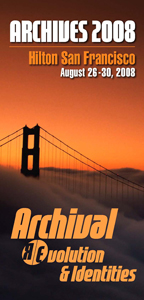As of August 22nd, 2008 it was official. There is even a blog post over on the NEH Office of Digital Humanities updates page to prove it. The University of Maryland was granted a Level I NEH Digital Humanities Startup Grant to fund work on the ‘Visualizing Archival Collections’ project. The official one liner is that the project will support “The development of visualization tools for assessing information contained in electronic archival finding aids created with Encoded Archival Description (EAD)”. Why did I wait so long to announce this on the blog? I wanted to have something fun to announce at the end of my SAA presentation out in San Francisco!
The project director is Dr. Jennifer Golbeck. I also have the support of University of Maryland’s Jennie Levine, Dr. Bruce Ambacher, and Dr. Doug Oard. This amazing set collaborators should help me stay on the right track and make sure I keep the sometimes competing issues relating to archives, information retrieval and interface design in balance.
I will be collecting EAD encoded finding aids over the next few months. My goal is to gather a broad sample of English language finding aids from a wide range of institutions and work on the script that extracts this data into a database. Once we have the data extracted I get to look at what we have, do some data cleanup and start thinking about what sorts of visualizations might work with our real world data. During the spring term we will design and build a 2nd generation prototype of ArchivesZ.
Want your data to be part of this? If you would like to contribute EAD finding aids in XML format to the project, please send me the following information:
- Archives Name
- Archives Parent Institution (if applicable)
- Archives Location
- Contact at Archives for questions about the finding aids (name, email and phone number)
- Estimate of # of finding aids being offered
- Controlled Vocabulary or Thesaurus used for Subject values (as many as are used)
- Method of finding aid delivery (sending me a zip file? pointing me at a directory online? some other way?)
- Do I have your permission to post a discussion of the data issues I may find in your finding aids here on Spellbound Blog? (Please see the OSU Archives post as an example of they types of issues I discuss)
You can either put this into the form on my Contact Page or send email directly to jeanne AT spellboundblog dot com.
Thank you to everyone for their enthusiasm about the ArchivesZ project. It is very exciting to have the opportunity to take all these shiny ideas to the next level.

